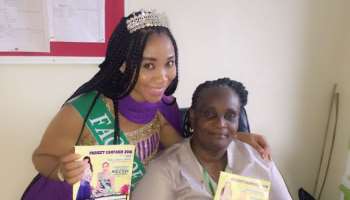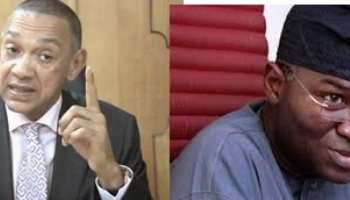Robin Williams Widow Shares Letter About His Final Year
The widow of comedian, Robin Williams has shared an emotional letter detailing the actor’s final year alive.
Susan Williams detailed her husbands struggle with Lewy Body Disease which eventually led to bis death in 2014.
Titled, ‘The terrorist inside my husband’s brain’, it was published in the scientific journal, Neurology.
”
am writing to share a story with you, specifically for you. My hope is that it will help you understand your patients along with their spouses and caregivers a little more. And as for the research you do, perhaps this will add a few more faces behind the why you do what you do. I am sure there are already so many.
This is a personal story, sadly tragic and heartbreaking, but by sharing this information with you I know that you can help make a difference in the lives of others.
As you may know, my husband Robin Williams had the little-known but deadly Lewy body disease (LBD). He died from suicide in 2014 at the end of an intense, confusing, and relatively swift persecution at the hand of this disease’s symptoms and pathology. He was not alone in his traumatic experience with this neurologic disease. As you may know, almost 1.5 million nationwide are suffering similarly right now.
Although not alone, his case was extreme. Not until the coroner’s report, 3 months after his death, would I learn that it was diffuse LBD that took him. All 4 of the doctors I met with afterwards and who had reviewed his records indicated his was one of the worst pathologies they had seen. He had about 40% loss of dopamine neurons and almost no neurons were free of Lewy bodies throughout the entire brain and brainstem.
Robin is and will always be a larger-than-life spirit who was inside the body of a normal man with a human brain. He just happened to be that 1 in 6 who is affected by brain disease.
Not only did I lose my husband to LBD, I lost my best friend. Robin and I had in each other a safe harbor of unconditional love that we had both always longed for. For 7 years together, we got to tell each other our greatest hopes and fears without any judgment, just safety. As we said often to one another, we were each other’s anchor and mojo: that magical elixir of feeling grounded and inspired at the same time by each other’s presence.
One of my favorite bedrock things we would do together was review how our days went. Often, this was more than just at the end of the day. It did not matter if we were both working at home, traveling together, or if he was on the road. We would discuss our joys and triumphs, our fears and insecurities, and our concerns. Any obstacles life threw at us individually or as a couple were somehow surmountable because we had each other.
When LBD began sending a firestorm of symptoms our way, this foundation of friendship and love was our armor.
The colors were changing and the air was crisp; it was already late October of 2013 and our second wedding anniversary. Robin had been under his doctors’ care. He had been struggling with symptoms that seemed unrelated: constipation, urinary difficulty, heartburn, sleeplessness and insomnia, and a poor sense of smell—and lots of stress. He also had a slight tremor in his left hand that would come and go. For the time being, that was attributed to a previous shoulder injury.
On this particular weekend, he started having gut discomfort. Having been by my husband’s side for many years already, I knew his normal reactions when it came to fear and anxiety. What would follow was markedly out of character for him. His fear and anxiety skyrocketed to a point that was alarming. I wondered privately, Is my husband a hypochondriac? Not until after Robin left us would I discover that a sudden and prolonged spike in fear and anxiety can be an early indication of LBD.
He was tested for diverticulitis and the results were negative. Like the rest of the symptoms that followed, they seemed to come and go at random times. Some symptoms were more prevalent than others, but these increased in frequency and severity over the next 10 months.
By wintertime, problems with paranoia, delusions and looping, insomnia, memory, and high cortisol levels—just to name a few—were settling in hard. Psychotherapy and other medical help was becoming a constant in trying to manage and solve these seemingly disparate conditions.
I was getting accustomed to the two of us spending more time in reviewing our days. The subjects though were starting to fall predominantly in the category of fear and anxiety. These concerns that used to have a normal range of tenor were beginning to lodge at a high frequency for him. Once the coroner’s report was reviewed, a doctor was able to point out to me that there was a high concentration of Lewy bodies within the amygdala. This likely caused the acute paranoia and out-of-character emotional responses he was having. How I wish he could have known why he was struggling, that it was not a weakness in his heart, spirit, or character.
early April, Robin had a panic attack. He was in Vancouver, filming Night at the Museum 3. His doctor recommended an antipsychotic medication to help with the anxiety. It seemed to make things better in some ways, but far worse in others. Quickly we searched for something else. Not until after he left us would I discover that antipsychotic medications often make things worse for people with LBD. Also, Robin had a high sensitivity to medications and sometimes his reactions were unpredictable. This is apparently a common theme in people with LBD.
During the filming of the movie, Robin was having trouble remembering even one line for his scenes, while just 3 years prior he had played in a full 5-month season of the Broadway production Bengal Tiger at the Baghdad Zoo, often doing two shows a day with hundreds of lines—and not one mistake. This loss of memory and inability to control his anxiety was devastating to him.
While I was on a photo shoot at Phoenix Lake, capturing scenes to paint, he called several times. He was very concerned with insecurities he was having about himself and interactions with others. We went over every detail. The fears were unfounded and I could not convince him otherwise. I was powerless in helping him see his own brilliance.
For the first time, my own reasoning had no effect in helping my husband find the light through the tunnels of his fear. I felt his disbelief in the truths I was saying. My heart and my hope were shattered temporarily. We had reached a place we had never been before. My husband was trapped in the twisted architecture of his neurons and no matter what I did I could not pull him out.
In early May, the movie wrapped and he came home from Vancouver—like a 747 airplane coming in with no landing gear. I have since learned that people with LBD who are highly intelligent may appear to be okay for longer initially, but then, it is as though the dam suddenly breaks and they cannot hold it back anymore. In Robin’s case, on top of being a genius, he was a Julliard-trained actor. I will never know the true depth of his suffering, nor just how hard he was fighting. But from where I stood, I saw the bravest man in the world playing the hardest role of his life.
Robin was losing his mind and he was aware of it. Can you imagine the pain he felt as he experienced himself disintegrating? And not from something he would ever know the name of, or understand? Neither he, nor anyone could stop it—no amount of intelligence or love could hold it back.
Powerless and frozen, I stood in the darkness of not knowing what was happening to my husband. Was it a single source, a single terrorist, or was this a combo pack of disease raining down on him?
He kept saying, “I just want to reboot my brain.” Doctor appointments, testing, and psychiatry kept us in perpetual motion. Countless blood tests, urine tests, plus rechecks of cortisol levels and lymph nodes. A brain scan was done, looking for a possible tumor on his pituitary gland, and his cardiologist rechecked his heart. Everything came back negative, except for high cortisol levels. We wanted to be happy about all the negative test results, but Robin and I both had a deep sense that something was terribly wrong.
On May 28th, he was diagnosed with Parkinson disease (PD).
We had an answer. My heart swelled with hope. But somehow I knew Robin was not buying it.
When we were in the neurologist’s office learning exactly what this meant, Robin had a chance to ask some burning questions. He asked, “Do I have Alzheimer’s? Dementia? Am I schizophrenic?” The answers were the best we could have gotten: No, no, and no. There were no indications of these other diseases. It is apparent to me now that he was most likely keeping the depth of his symptoms to himself.
Robin continued doing all the right things—therapy, physical therapy, bike riding, and working out with his trainer. He used all the skills he picked up and had fine-tuned from the Dan Anderson retreat in Minnesota, like deeper 12-step work, meditation, and yoga. We went to see a specialist at Stanford University who taught him self-hypnosis techniques to quell the irrational fears and anxiety. Nothing seemed to alleviate his symptoms for long.
Throughout all of this, Robin was clean and sober, and somehow, we sprinkled those summer months with happiness, joy, and the simple things we loved: meals and birthday celebrations with family and friends, meditating together, massages, and movies, but mostly just holding each other’s hand.
Robin was growing weary. The parkinsonian mask was ever present and his voice was weakened. His left hand tremor was continuous now and he had a slow, shuffling gait. He hated that he could not find the words he wanted in conversations. He would thrash at night and still had terrible insomnia. At times, he would find himself stuck in a frozen stance, unable to move, and frustrated when he came out of it. He was beginning to have trouble with visual and spatial abilities in the way of judging distance and depth. His loss of basic reasoning just added to his growing confusion.
It felt like he was drowning in his symptoms, and I was drowning along with him. Typically the plethora of LBD symptoms appear and disappear at random times—even throughout the course of a day. I experienced my brilliant husband being lucid with clear reasoning 1 minute and then, 5 minutes later, blank, lost in confusion.
Prior history can also complicate a diagnosis. In Robin’s case, he had a history of depression that had not been active for 6 years. So when he showed signs of depression just months before he left, it was interpreted as a satellite issue, maybe connected to PD.
Throughout the course of Robin’s battle, he had experienced nearly all of the 40-plus symptoms of LBD, except for one. He never said he had hallucinations.
A year after he left, in speaking with one of the doctors who reviewed his records, it became evident that most likely he did have hallucinations, but was keeping that to himself.
Latest News
-
 I Don't Like Being Sprayed With Money —- Seun Kuti
I Don't Like Being Sprayed With Money —- Seun Kuti -
 “I Wouldn't Advise Myself To Be With Someone In My
“I Wouldn't Advise Myself To Be With Someone In My -
 Nollywood Actress, Etinosa Idemudia Stands With Ph
Nollywood Actress, Etinosa Idemudia Stands With Ph -
 Bobrisky Heads To Appeal Court, Challenges Six-mon
Bobrisky Heads To Appeal Court, Challenges Six-mon -
 “Sometimes, The Answers To Your Problems Lies In Y
“Sometimes, The Answers To Your Problems Lies In Y -
 “Man Of The Year" - Pretty Mike Crowns Portable
“Man Of The Year" - Pretty Mike Crowns Portable -
 Yingi Debuts "Waterside Girl EP"; A Melodic Journe
Yingi Debuts "Waterside Girl EP"; A Melodic Journe -
 Singer, Joeboy Reveals Criteria For Men To Know Tr
Singer, Joeboy Reveals Criteria For Men To Know Tr -
 “I Wish I Had Found Love Before Now– Spyro
“I Wish I Had Found Love Before Now– Spyro -
 Toyin Abraham Appreciates Funke Akindele, Barring
Toyin Abraham Appreciates Funke Akindele, Barring














